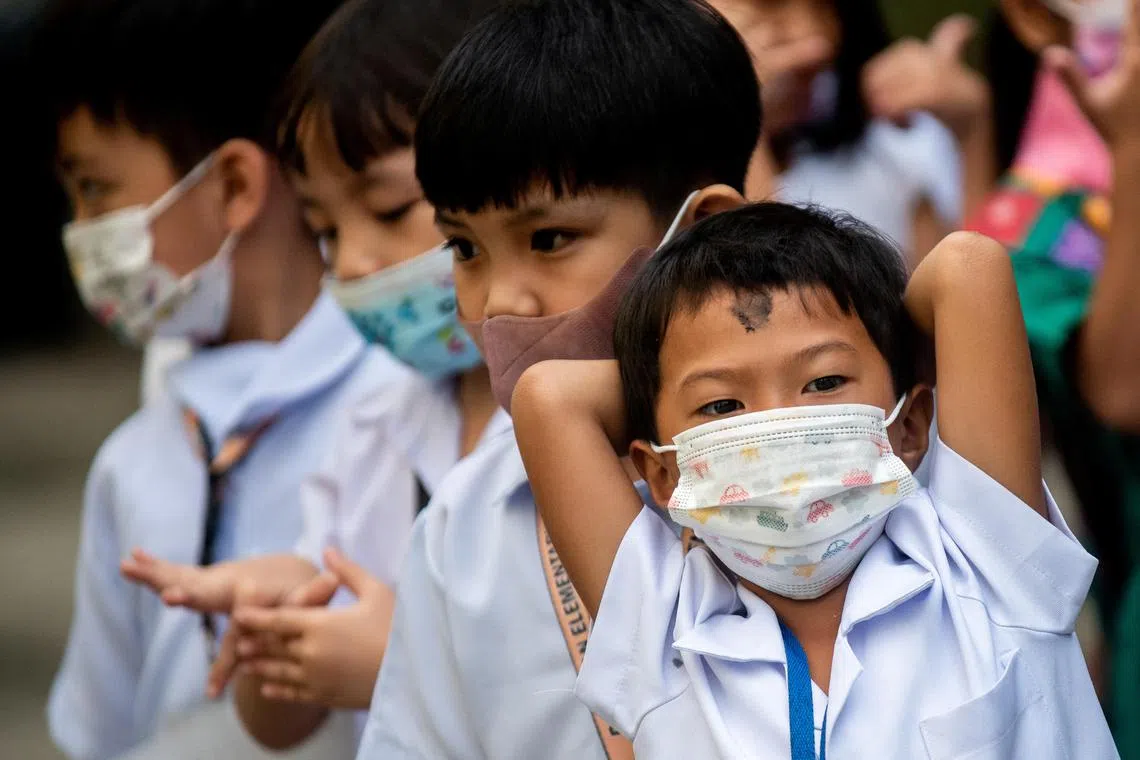Philippines says schools can call off in-person classes to protect students from heat
Sign up now: Get insights on Asia's fast-moving developments

There are concerns that public schools are not fully equipped to deal with high temperatures during the dry season.
PHOTO: REUTERS
MANILA – As parts of the Philippines attempt to cope with the summer heat, the country’s Department of Education (DepEd) said on Saturday that school authorities can call off in-person classes to safeguard the health of their students and staff.
The Alliance of Concerned Teachers (ACT) expressed worries that public schools are not fully equipped to deal with high temperatures during the dry season.
DepEd spokesman Michael Poa said principals and school heads have been reminded that they have the “authority and responsibility to suspend in-person classes and switch to alternative delivery modes if it is really hot and already affecting the health of our learners and personnel”.
“We also don’t want our learners’ health to be affected, especially with the very hot temperature we are experiencing, which is why we are again reminding our school heads that they can immediately switch to alternative mediums,” he said.
In March, one official, Mayor Dennis Hain of Cabuyao City in Laguna province, took action in response to the hot weather that affected students in his city.
He suspended classes on March 24, a day after 83 students were hospitalised for heat exhaustion during fire and earthquake drills.
Some of the students had difficulty breathing and complained that the afternoon heat was “too much for them to bear”, the City Schools Division of Cabuyao said in a statement.
The incident prompted Senator Sherwin Gatchalian, who chairs the Senate Committee on Basic Education, to call for the return of the old school calendar, asking the national government to bring back the April to May “summer vacation”.
‘Not conducive’
ACT secretary-general Raymond Basilio said the hot weather, which could last until May, should push the DepEd to revert to the old school calendar where classes start in June, to avoid holding classes during the hot and dry season.
“In the Philippines’ context, it is not really conducive to have classes during this period since we lack the facilities to handle this, especially in public schools,” he told the Philippine Daily Inquirer.
Mr Basilio said the decision of tasking school heads to suspend classes was only a “temporary solution”.
“The DepEd should really take this seriously by consulting with teachers and other school personnel on the field and come up with mechanisms that would bring us back to our old school calendar,” he stressed.
On May 11, 2020, the department decided to move the opening of the 2020 to 2021 school year from June to August 2020, because of the Covid-19 pandemic.
The August to April school calendar was continued by Vice-President Sara Duterte, who is also the Education Secretary, for the 2022 to 2023 school year.
‘Init’ factor
On Thursday, the highest temperature recorded in Metro Manila was 36.2 deg C, up from 35 deg C the previous day. The temperature in the capital reached 35.9 deg C on Friday.
The weather bureau has also been reporting on the “heat index”, or what is called the “init factor” in Tagalog, the apparent temperature felt by the human body from the combined air temperature and humidity, which is different from what is recorded by a thermometer.
Heat indices between 41 deg C and 54 deg C are considered “dangerous” and could cause heat cramps and heat exhaustion, and heatstroke is probable with continued activity.
A heat index above 54 dec C is “extremely dangerous” as heatstroke is imminent, according to the Philippine Atmospheric, Geophysical and Astronomical Services Administration.
Weather specialist Daniel Villamil said the recent hot days are “all because of the dry season we are experiencing”.
He said the hot temperatures may continue in the coming days and last until May, interrupted only by local thunderstorms that could result in relatively cooler weather.
According to the Science Advances journal, the human body can tolerate heat up to 35 deg C, beyond which it can no longer cool itself by perspiring to maintain a stable core temperature.
Health risks
The Department of Health said heatstroke, which is a medical emergency, can occur during exercise, prolonged exposure to direct sunlight and when the body is dehydrated.
If untreated, it can damage the brain, heart and kidneys, resulting in serious complications or even death.
Symptoms include dizziness, fainting, headache, intense thirst and dehydration and a very high temperature and rapid heartbeat.
The ministry advised people to keep cool, avoid spending much time outdoors, as well as drink water rather than tea, coffee, soda, and alcoholic beverages on the hottest days.
When sun exposure is unavoidable, it said, people should wear wide-brimmed hats and long-sleeved clothing.
Strenuous activities and exercise should be scheduled at the beginning or end of the day when the temperature is lower. THE PHILIPPINE DAILY INQUIRER/ASIA NEWS NETWORK


